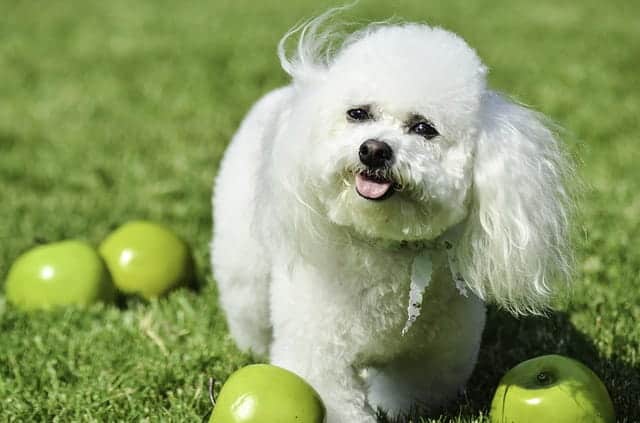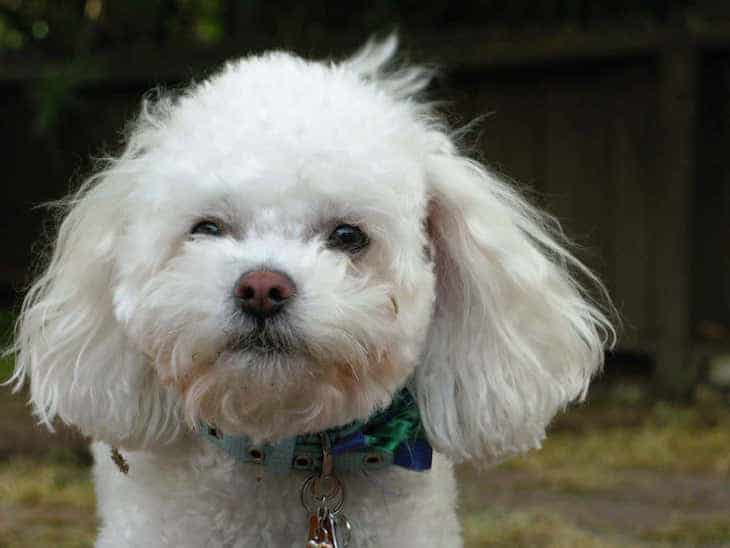
The realist's guide to choosing and caring for your Bichon Frise puppy
If you're reading this, you've probably decided to get yourself a Bichon Frise puppy, and to be honest, we don't blame you one bit.
Bichons are adorable little dogs when they are adults, but when they are puppies, their cuteness is off the scale!
Those untamed, disheveled curls and button eyes make them look just like antique teddy bears.
But to figure out if a Bichon is the right dog breed for you and your family, you need to consider more than just looks.
Is a Bichon right for you? Here's what you need to know

Here are a few facts about the Bichon Frise personality and care needs you'll want to consider before making your final decision.
Personality
Bichons love people and will want to spend as much time as possible close to you or on top of you. They really won't enjoy spending much alone time.
You can help your puppy get used to short periods alone if you start introducing this when they are young. But the average Bichon's ideal home is one where their human can hang out with them for most of the day.
Kids and other pets
Bichons tend to get on great with children, but you'll need to be especially vigilant when the Bichon is still a small and fragile puppy.
Grooming time commitment
It's hard to exaggerate just how much time it takes to groom a Bichon. I mean, those tidy, fluffy white hair-dos don't appear by magic!
If you have the spare cash to get your dog professionally groomed each month, then great.

If not, you're going to have to devote many hours to learning how to groom your Bichon Frise properly and many more hours to regularly maintain the look.
Lifespan
The Bichon Frise is a relatively long-lived breed. Assuming you look after them well, your pup should be with you for 15 years or more.
Make sure you are ready for this sort of long term commitment.
Should you get a puppy or an adult Bichon Frise?
A puppy of any breed of dog is going to be a considerable commitment and demand a lot of your time, especially in the beginning few months. You should only get a puppy if you are willing to:
- Get up in the night in the first few weeks to help your puppy with early toilet training
- Spend a lot of time at home as your puppy settles in
- Take your puppy out for regular socializing in lots of different places
- Enroll your puppy for training classes and take them along each week

For many families, particularly busy ones with small children, an adult Bichon is a better option than a puppy.
Most adults will come from homes where they've had toilet training and other basic obedience training.
When to buy your Bichon Frise puppy
Although Christmas is the traditional occasion to present a new puppy to your kids, it's actually one of the worst times of year to bring a young dog into a home.
The house is likely to be in a state of chaos. Visitors are probably popping in and out regularly, and children are already very excited.
Festive treats like chocolate are commonly wrapped up on the floor or left on coffee tables.
Can you imagine introducing a new puppy and all its needs into that sort of environment? The poor little thing is going to feel overwhelmed by all the goings-on.
And once the festive season is over, you then have to toilet train your new puppy through the bitter cold months of January and February.
It's not going to be a pleasant experience standing outside in your dressing gown at 3 am in the cold, trying to get little Henry to go potty.
Do yourself and your family a favor and bring your puppy home in the summer.

Warm long days are perfect for spending time outdoors training and socializing your puppy.
Acquiring your new pup in summer also means that it's likely other members of the house are out of school or college and available to help with puppy chores.
Having more than one person to assist will help ease the strain on the primary puppy carer. Since you are reading this, we assume that the primary carer is likely to be you!
Finding your puppy
We heartily recommend buying your puppy from a respected breeder. It could save you a small fortune on vets fees in the long run.
Puppy farms are sadly all too common in the U.S. The owners run them for a quick profit and have little concern for animal welfare. Conditions are usually miserable for breeding bitches and their new litters.
Puppy farm owners often skimp on primary veterinary care. If puppies have not had the correct vaccinations and parasite protection when they are little, they could end up very poorly indeed.
Puppy farm puppies will often be sold in online ads or on trading websites. There are a few clues you can look out for to avoid buying from these sellers.
Be especially wary if the so-called ‘breeder':
- Does not want you to see the mother or father and where the puppies live
- Does not ask you questions about how you will care for the puppy
- Cannot provide you with papers or genetic health testing details for the parents
- Cannot provide proof of vaccinations
How to find a respected Bichon Frise breeder
You can find a directory of excellent Bichon Frise breeders on the Bichon.org website run by the Bichon Club of America. Many breeders who breed their dogs for showing will often sell puppies from litters that are not quite up to show standards.
There will be absolutely nothing wrong with these pups, and they are sure to make super pets. If you buy a ‘pet quality' Bichon Frise, you usually have to sign something to say you will get them neutered or spayed as soon as they are old enough.
Checkout our Complete Guide to Breeders:
We wrote the definitive guide on finding, selecting, and dealing with dog breeders. This will give you the smarts and confidence to save you money, time and heartache. Read On…
What to look for in a good breeder
A good breeder who genuinely loves the Bichon Frise breed will ask you lots of questions.
They'll also give you lots of valuable advice on future vet care, nutrition, training and want to stay in touch with you to help resolve any problems.
A good breeder will screen the parents for common genetic issues before breeding.
Bichon parents get screened for certain eye conditions, patella luxation (dislocated kneecaps), hip dysplasia, and sometimes allergies.
Registration numbers help identify if this screening has been done.
The letters C.E.R.F. on a registration document means that eye problems have been tested for. And the letters O.F.A. indicates screening for orthopedic issues have been completed.
The Bichon Club of America recommends that you check the health records of your future puppy's parents on CHIC (Canine Health Information Centre).
Here you can find details of regular exams for patella and eye problems and results of a test done at two years of age for hip dysplasia and Legg-Calve-Perthes disease.
When should you take your puppy home?
We know you are keen to get your hands on that adorable ball of fur. But your puppy should never be forced to leave his or her littermates before they reach the age of 8 weeks.
Bichon puppies are much better off with their littermates and mother until they are at least ten weeks. Ideally, a puppy will spend his or her first 12 weeks with his family.
How do I prepare my home for a new Bichon Frise puppy?

Preparing your home in advance well before your little puffball can be picked up will save you a lot of hassle and worry.
Here's our checklist for things you should look at before your puppy comes home
- Find a really good local veterinary clinic. You’ll need to take your puppy there for various vaccinations against canine diseases and booster injections.
- Check your yard fencing is all intact. The Bichon Club of America warns against electric fences as these won't protect your small Bichon from off-lead big dogs or coyotes. It also won't prevent your pup from being stolen.
- Buy a secure trash can. A pedal bin with a flush opening that can't be nosed open is ideal.
- Remove any poisonous plants from indoors and the garden
- Secure and cover any loose electrical cables.
- Remove valuable items from the floor, such as expensive designer shoes or handbags.
- Set up baby gates around the house so you can control your pup's movements and keep a closer eye on them.
- Train other family members on the importance of not leaving external doors open – particularly the front door!
What do you need for your new Bichon Frise puppy?
Here's a little shopping list of things you'll need to purchase for your pup:
- A dog crate with a fitted cushion or a cozy bed
- Food and water bowls
- A bag of dog food and some treats (get the brand your puppy is eating already)
- Some puppy toys to play with
- Puppy training pads and some enzyme cleaner
- A small leash and collar
Bringing home your bundle of fur – early days with your Bichon Frise puppy
If you've bought your puppy from a respected breeder, then your little lady or gentleman should already be off to a flying start.

They'll have been socialized and exposed to all sorts of things at the breeder's house.
Spending this extra time with her brothers and sisters was vital to help your puppy understand how to interact with other dogs.
Now it's up to you to continue your pup's education and socialization in a wide variety of places.
Socialization
One of the best ways to make sure your little puppy grows up into a confident and happy adult is to socialize them.
What is socialization? It means making sure your puppy meets as many people and other animals as possible while still young.
It widens his experience bubble and makes him much more likely to cope with novel experiences later in life.
If you are not naturally a friendly person, then get ready to make some changes – your pup needs you to become a chatty Cathy!
Once he has his shots, your pup should go on all the outings he can. Visit friends, go to parks, walk on the beach. You should even take your puppy into stores if he's allowed.
Make a special effort to fit in trips to the vet and the groomer and other places your Bichon is going to have to visit regularly as an adult.
You may also want to take your pup to the local kennel if you plan to board them there when you go on holiday.
Introducing your Bichon Frise puppy to children
Your kids are going to be shaking with excitement the day you bring the new puppy home.
But try to limit their time with the new arrival at first to prevent the puppy from feeling overwhelmed.
Given time to adjust, most Bichon puppies end up adoring children, but an adult must always be around to supervise.
As a small breed, little Bichon puppies can be fragile and easily hurt by a more boisterous child.

Teach your kids to respect the puppy's space and not to touch certain areas like the tail or paws.
Turning your Bichon puppy into a good doggy citizen
Your pup can start attending puppy obedience classes from just 12 weeks of age so long as they've had their shots.
All puppies benefit from these classes in the basics of obedience.
They are also an excellent opportunity for your puppy to meet other types of dogs in all shapes and sizes and learn how to play with them.
Housetraining
You may have heard that toilet training Bichons can be a bit of a nightmare.
Make sure you are prepared and have a plan for this challenge before you bring your Bichon home.
Allowing things to go wrong in the early days can cause long setbacks.
According to the respected breeder and author of Baron's Dog Bible Bichon Frise, Richard G Beauchamp, female Bichons can take longer than males to get the hang of toileting outdoors.
Helpful Online Dog Training Resource:
The Online Dog Trainer by Doggy Dan a world-class Dog Trainer from New Zealand is worth taking a look at. This online resource has hundreds of fun informative dog training videos that can help you learn the basics and more.
The Crate Method
Beauchamp recommends the classic crate method to train your new Bichon puppy about the appropriate location to go potty.
Just like their wolf ancestors, dogs have a natural dislike of toileting in their sleeping area or den.
The trick with crate training is to make the ‘den' feel like the puppy's happy place. It should be a location they associate with cozy naps, fun toys, tasty treats.
When you are crate training, try to stay consistent.
Whenever you take your puppy out of the crate, you should immediately take them outside for an opportunity to do a Number-1 or Number-2.
Make sure your puppy gets tons of over the top praise for doing his business in the right place! If you stay consistent, your puppy will soon get the hang of things.

Calvin is the co-founder and one of the main contributors to dogtemperament.com. He has been an avid dog lover all his life. He enjoys researching and sharing great ideas on how you can avoid common pitfalls of dog ownership and build the most loving and enjoyable relationship with your dog.